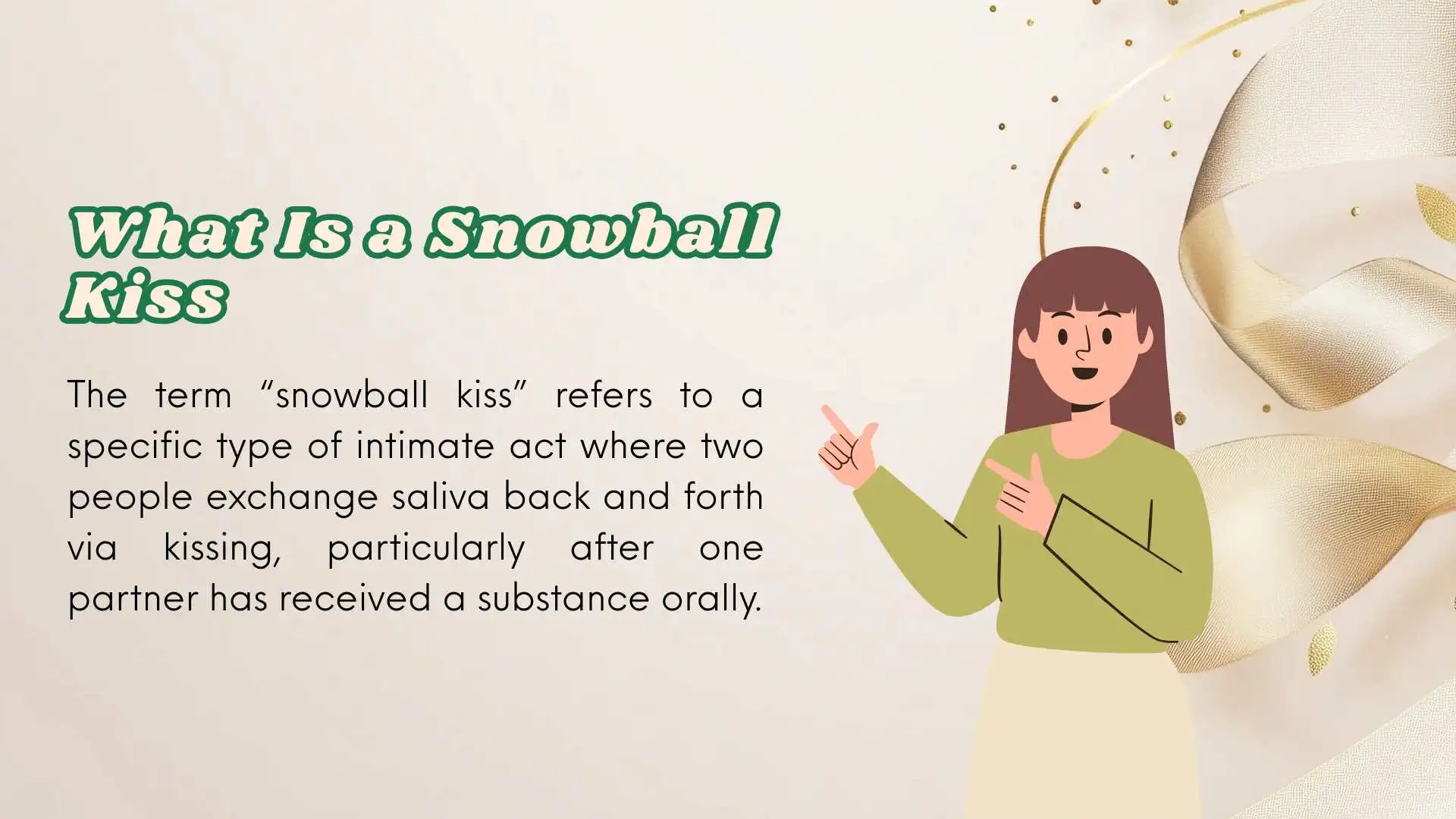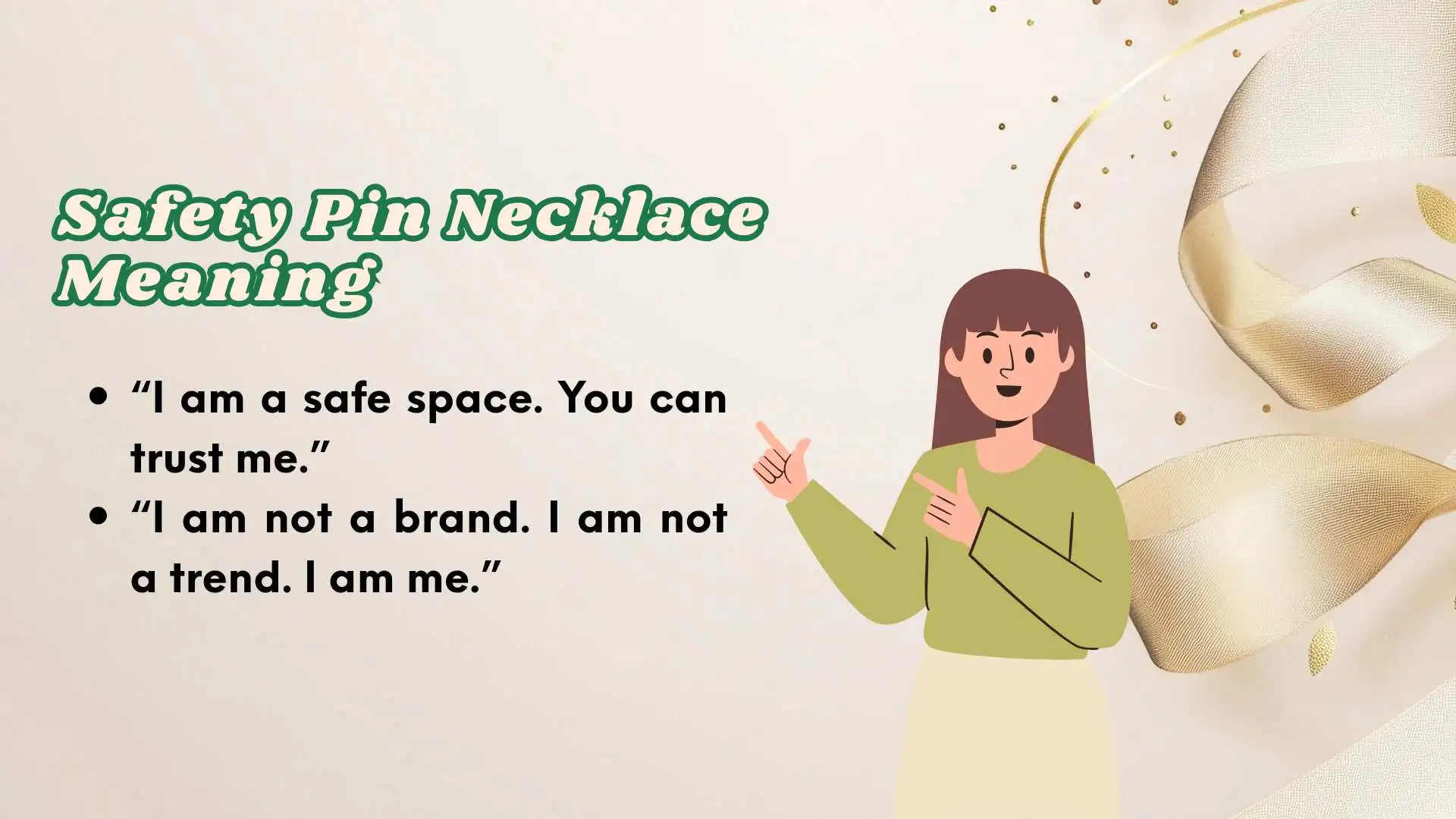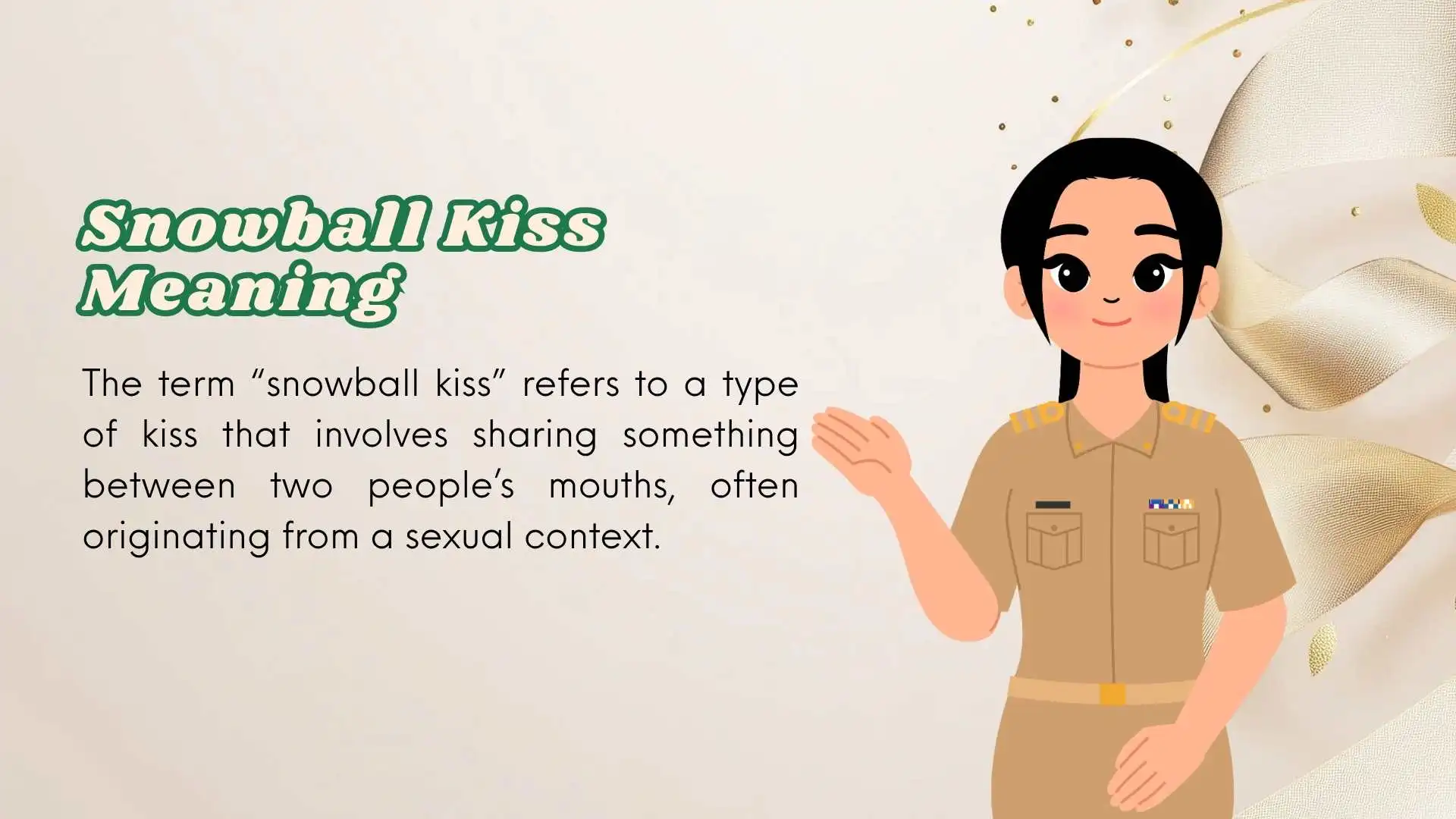Meaning, Context, Alternatives & How to Respond Appropriately in 2025
In today’s hyper-connected digital age, slang evolves faster than ever.
One such term that’s left many people—especially parents, educators, and even young adults—scratching their heads is the “Snowball Kiss.”
You might’ve come across it in a text, a TikTok comment, or even in casual conversation, and instantly wondered:
“Is it innocent or inappropriate?”
“Is this something I should be worried about?”
Welcome to the most accurate, up-to-date, and in-depth guide of 2025 on the topic. We’ll break down the true meaning of “snowball kiss,” its origin, how it’s used in modern contexts, and most importantly, how to talk about it professionally or politely when necessary.
Let’s demystify this term completely—no fluff, just facts.
What Does “Snowball Kiss” Mean?
The term “snowball kiss” refers to a specific type of intimate act where two people exchange saliva back and forth via kissing, particularly after one partner has received a substance orally. The term can have sexual undertones, especially among Gen Z and Gen Alpha in 2024–2025 slang.
⚠️ Caution: The expression is often used suggestively and is not typically appropriate for formal or professional conversations.
In its rawest form, it’s a colloquial and graphic slang term, often circulated on:
- TikTok challenge videos
- NSFW memes
- Anonymous chat forums (e.g., Reddit, Discord)
- Slang dictionaries like Urban Dictionary
Evolution of the Term (New in 2025)
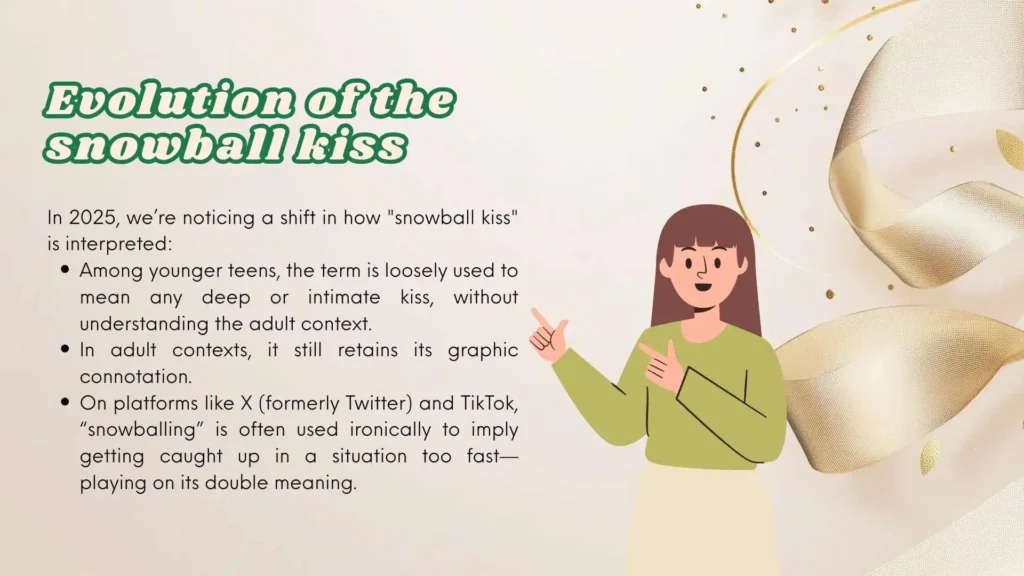
In 2025, we’re noticing a shift in how “snowball kiss” is interpreted:
- Among younger teens, the term is loosely used to mean any deep or intimate kiss, without understanding the adult context.
- In adult contexts, it still retains its graphic connotation.
- On platforms like X (formerly Twitter) and TikTok, “snowballing” is often used ironically to imply getting caught up in a situation too fast—playing on its double meaning.
Social Implication:
It’s often used to shock, joke, or provoke reactions, rather than describe real-life behavior.
When Might You Encounter This Phrase?
You may come across “snowball kiss” in:
- A meme with exaggerated romantic/sexual tension
- A message from a teen or young adult being playful (or inappropriate)
- A text or DM using coded slang for adult acts
- Online debates around youth behavior, boundaries, or consent
Is It Offensive?
Yes and no.
The term is not inherently profane, but its implication is highly sexualized, and for many audiences, it’s:
- Inappropriate in professional settings
- Uncomfortable in casual settings
- NSFW (Not Safe For Work) or public use
Think of it like other modern slang:
- Harmless-sounding but carries deeper meaning
- Not meant for use in formal writing or conversations
- Often requires discretion, especially around younger audiences
Alternatives to Using “Snowball Kiss”
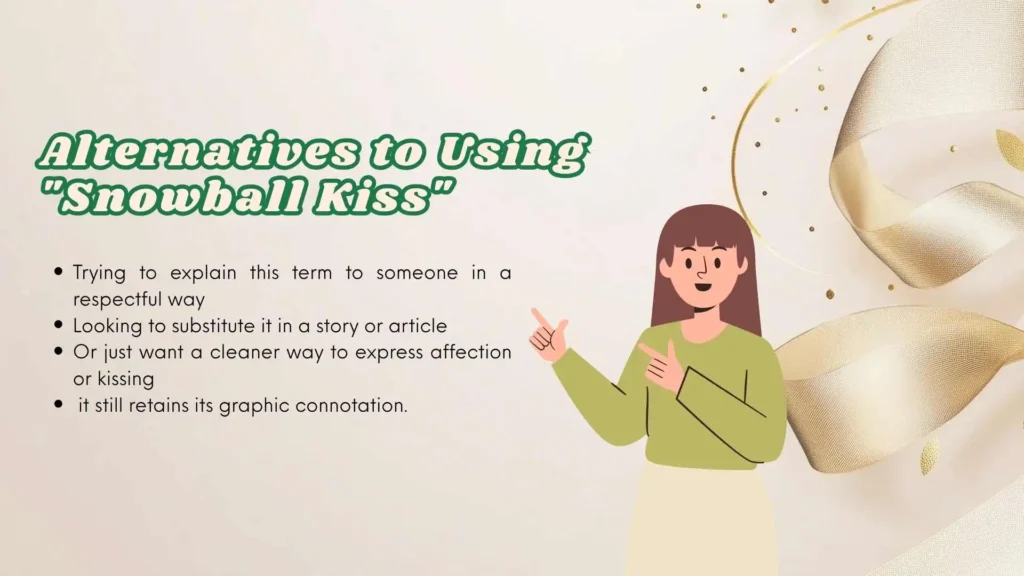
Whether you’re:
- Trying to explain this term to someone in a respectful way
- Looking to substitute it in a story or article
- Or just want a cleaner way to express affection or kissing
Below are 10 high-quality alternatives, with examples and notes on usage to help you stay respectful and appropriate across contexts.
🔟 Clean & Contextual Alternatives to “Snowball Kiss”
1. Passionate Kiss
Best for: Describing deep, emotional intimacy without being graphic.
Example:
“They shared a passionate kiss under the stars—it felt like time stopped.”
✅ Romantic, respectful, and suitable for all audiences.
2. Deep Kiss
Best for: Slightly more intense than a simple kiss, but still polite.
Example:
“Their deep kiss signaled more than just chemistry—it was connection.”
✅ Common in literature, teen dramas, and romance novels.
3. Lingering Kiss
Best for: Emotionally expressive scenes.
Example:
“She gave him one last lingering kiss before boarding the plane.”
✅ No innuendo, suitable for fiction and storytelling.
4. French Kiss
Best for: Accurately describes tongue kissing without vulgarity.
Example:
“He leaned in for a French kiss, and she met him halfway.”
⚠️ Mildly sensual but widely accepted in modern vocabulary.
5. Intimate Kiss
Best for: When the emotional closeness matters more than the physical.
Example:
“It was an intimate kiss that said everything words couldn’t.”
✅ Great for mature or serious moments without crossing the line.
6. Slow Kiss
Best for: Expressing sensuality without being explicit.
Example:
“Their slow kiss was full of hesitation and longing.”
✅ Well-suited for romantic or dramatic writing.
7. Affectionate Kiss
Best for: Describing warmth and emotional safety.
Example:
“He gave her an affectionate kiss on the forehead before bed.”
✅ Appropriate in parental, romantic, or caring contexts.
8. Mutual Kiss
Best for: Emphasizing consent and equality.
Example:
“It was a mutual kiss, full of trust and mutual understanding.”
✅ Important phrasing for respectful and mindful communication.
9. Playful Kiss
Best for: Flirty, light-hearted situations.
Example:
“She gave him a playful kiss on the cheek before dashing away.”
✅ Perfect for young adult stories or sweet gestures.
10. Exchange of Kisses
Best for: Neutral, formal, and non-sensual descriptions.
Example:
“They exchanged kisses as a farewell gesture.”
✅ Excellent for professional or cross-cultural uses.
When Not to Use “Snowball Kiss”
To keep yourself respectful, brand-safe, and socially appropriate in 2025, avoid this term in:
- Work emails or Slack chats (even as a joke)
- School essays or student discussions
- Public-facing blog posts (unless defining it, like this article)
- Messages to people you’re not close with
- Instagram captions or comments under minors’ content
Instead, use any of the 10 alternatives depending on the tone and intention.
How to Explain “Snowball Kiss” to Someone Politely
If someone asks you what it means and you’re in a setting that demands maturity and professionalism, use a polite phrasing like:
“It’s an internet slang term referring to a type of kiss that involves intimate exchange. It’s often used informally or jokingly online and may not be appropriate for all audiences.”
For younger people (teens, students), say:
“It’s one of those slang terms from TikTok or memes—it usually implies something romantic or sometimes inappropriate. Not something you need to use.”
Cultural Sensitivity and Slang in 2025
Language is evolving rapidly. In 2025, more than 60% of English-speaking youth use slang as primary communication online. This means:
- Terms like “snowball kiss” get misused or misunderstood frequently.
- AI filters, moderation tools, and digital educators (like parents or teachers) must stay informed without overreacting.
- Slang literacy is becoming as important as reading comprehension in digital spaces.
Final Thoughts: Why This Matters
Understanding and explaining slang like “snowball kiss” may seem minor—but in reality, it’s a digital literacy skill.
It helps you:
- Stay ahead of inappropriate or risky content
- Communicate with sensitivity and precision
- Avoid accidental offense
- Teach or parent more effectively
- Maintain professionalism while staying informed
So next time you hear this term—or one like it—you won’t be caught off guard.

Sapphire Drift is a passionate storyteller known for weaving imagination with emotion. With a unique voice and an eye for detail, she crafts narratives that linger long after the last page is turned. Her writing dives deep into the complexities of human emotions, relationships, and self-discovery.
She is the author of “Whispers Beneath the Moonlight”, a hauntingly beautiful tale of love and loss, “The Echoes of Her Silence”, a psychological drama that keeps readers at the edge of their seats, and the inspirational “Letters to My Future Self”, a soul-stirring collection of reflections and affirmations.

